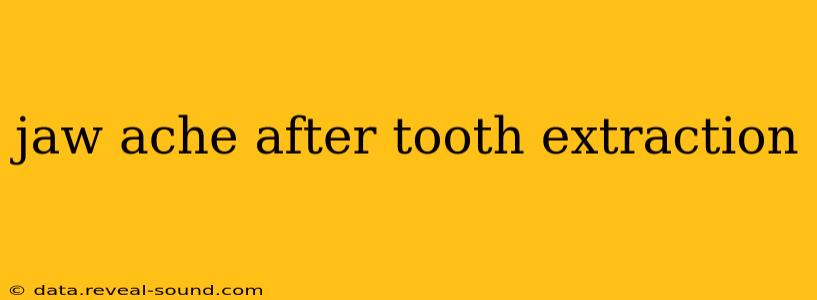A jaw ache after a tooth extraction is a common experience, often causing significant discomfort. Understanding the causes, effective treatments, and preventative measures can significantly improve recovery and alleviate pain. This comprehensive guide addresses common concerns and provides valuable information for anyone facing this issue.
What Causes Jaw Ache After Tooth Extraction?
Several factors can contribute to jaw pain following a tooth extraction. The most prevalent reasons include:
- Inflammation: The extraction site undergoes a natural healing process involving inflammation. This inflammation can radiate to the surrounding jaw, causing pain and stiffness. This is a normal part of healing, but excessive inflammation can indicate a problem.
- Dry Socket: Also known as alveolar osteitis, this is a painful condition where the blood clot at the extraction site dislodges or dissolves prematurely, exposing the bone and nerve endings. This is a severe complication that requires immediate professional attention.
- Referred Pain: Pain originating from the extraction site can sometimes be felt in other areas of the jaw or even the ear and temple due to the complex network of nerves in the face.
- Muscle Strain: Opening the mouth wide during the procedure, or clenching the jaw during the extraction, can lead to muscle strain and subsequent pain.
- Infection: In some cases, an infection can develop at the extraction site, causing intense pain in the jaw and other symptoms like swelling, fever, and pus. This requires prompt medical intervention.
- Sinus Issues: Extractions of upper teeth, particularly molars, can sometimes affect the sinuses, leading to pain that feels like jaw pain.
How Long Does Jaw Ache After Tooth Extraction Last?
The duration of jaw ache varies greatly depending on the individual, the complexity of the extraction, and the presence of any complications. Generally, mild discomfort and soreness should subside within a week or two. However, persistent or worsening pain beyond this timeframe warrants a visit to your dentist.
How to Treat Jaw Ache After Tooth Extraction?
Managing jaw ache after a tooth extraction often involves a combination of self-care and professional intervention:
- Over-the-Counter Pain Relief: Medications like ibuprofen or acetaminophen can effectively manage pain and reduce inflammation. Always follow the recommended dosage.
- Ice Packs: Applying ice packs to the affected area for 15-20 minutes at a time, several times a day, can help reduce swelling and numb the pain.
- Rest: Allowing the extraction site to heal properly is crucial. Avoid strenuous activities and ensure adequate rest.
- Gentle Rinsing: After 24 hours, you can gently rinse your mouth with saltwater to keep the area clean and prevent infection.
- Soft Foods: Stick to soft foods that don't require extensive chewing for the first few days to minimize irritation.
- Avoid Smoking and Alcohol: Smoking and alcohol can impede healing and increase the risk of complications.
What to Do if Your Jaw Hurts Severely After Tooth Extraction?
Severe jaw pain, particularly accompanied by swelling, fever, or pus, could indicate a serious complication like dry socket or infection. Seek immediate dental attention if you experience any of these symptoms. Do not attempt to self-treat serious complications.
Can You Prevent Jaw Ache After a Tooth Extraction?
While some jaw ache is unavoidable, you can take steps to minimize discomfort:
- Follow Your Dentist's Instructions: Meticulously follow your dentist's post-operative instructions regarding medication, diet, and oral hygiene.
- Proper Oral Hygiene: Maintaining excellent oral hygiene before and after the extraction reduces the risk of infection.
- Stress Management: Reducing stress can contribute to faster healing.
Is Jaw Ache After Tooth Extraction Normal?
Some level of jaw ache is indeed normal after a tooth extraction due to the trauma and healing process. However, the level of pain and its duration should be monitored. If the pain is severe, persistent, or accompanied by other symptoms, professional evaluation is necessary.
When Should You See a Dentist After Tooth Extraction?
Contact your dentist immediately if you experience:
- Severe or persistent pain
- Excessive swelling
- Fever
- Bleeding that doesn't stop after several hours
- Signs of infection (pus, foul odor)
- Difficulty opening your mouth
By understanding the causes, treatment options, and preventative measures associated with jaw ache after a tooth extraction, individuals can effectively manage their discomfort and ensure a smoother recovery process. Remember, seeking professional dental care promptly for persistent or severe pain is crucial for preventing complications and achieving optimal healing.
